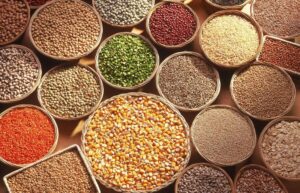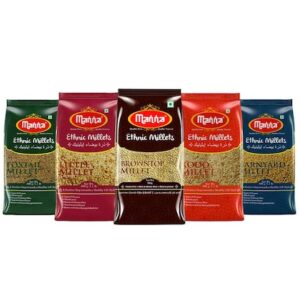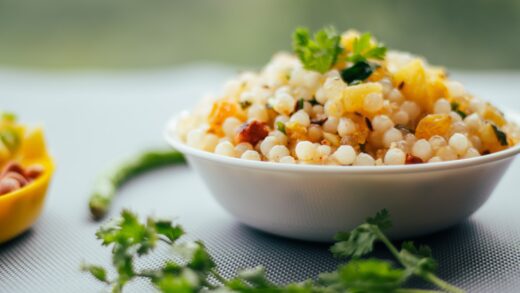Title: Millets: The Nutritional Powerhouse for a Healthier Tomorrow
Introduction
The United Nations declared this year as the International Year of Millets, a celebration of these small but mighty grains that have been a staple in the diets of millions around the world for centuries. This initiative was suggested by Indian Prime Minister Mr. Narendra Modi, recognizing the immense potential of millets in addressing food security and nutritional needs. In this blog post, we will explore the various health benefits of millets and delve into their impressive nutritional value, highlighting their role in managing and preventing various health conditions.

The Nutritional Value of Millets
Millets are a group of small-seeded grains that are a rich source of essential nutrients. They come in various varieties, including sorghum, pearl millet, foxtail millet, finger millet, and more. The nutritional profile of millets makes them stand out as a superfood.
1. Rich in Fiber:
Millets are high in dietary fiber, which is essential for digestion and helps in maintaining a healthy gut. The fiber content in millets also contributes to a feeling of fullness, making them a great choice for those looking to manage their weight.
2. Protein-Packed:
Millets are a good source of plant-based protein, making them an excellent choice for vegetarians and vegans. They contain essential amino acids and can help in muscle development and repair.
3. Low Glycemic Index:
Millets have a low glycemic index, which means they release sugar into the bloodstream slowly, helping in better blood sugar control. This is particularly beneficial for individuals with diabetes.
4. Rich in Vitamins and Minerals:
Millets are packed with essential vitamins and minerals, including B vitamins, magnesium, phosphorus, and iron. These nutrients are crucial for maintaining overall health and well-being.
5. Gluten-Free:
Millets are naturally gluten-free, making them a safe choice for those with celiac disease or gluten sensitivity.
Health Benefits of Millets
Now, let’s explore the numerous health benefits associated with including millets in your diet.
1. Weight Management:
The high fiber content in millets can help with weight management by promoting a feeling of fullness and reducing overall calorie intake.
2. Heart Health:
Millets are heart-healthy grains. They are low in saturated fat and can help lower cholesterol levels, reducing the risk of heart diseases.
3. Diabetes Management:
The low glycemic index of millets helps in regulating blood sugar levels. This makes them an excellent choice for individuals with diabetes or those at risk of developing the condition.
4. Digestive Health:
The fiber in millets aids in digestion and can prevent digestive issues such as constipation.
5. Bone Health:
Millets are a good source of calcium and magnesium, essential for maintaining strong and healthy bones. They are particularly beneficial for individuals at risk of osteoporosis.
6. Antioxidant Properties:
Some millets, like finger millet (ragi), are rich in antioxidants. These compounds help in fighting free radicals and reducing the risk of chronic diseases.
7. Skin and Hair Health:
The vitamins and minerals in millets contribute to healthier skin and hair.
8. Nutrient-Dense for Pregnancy:
Millets are a valuable addition to the diet of pregnant women due to their rich nutrient profile. They provide essential nutrients for both the mother and the developing baby.
How to Incorporate Millets Into Your Diet
Click Here To Buy Best Selling Millets on Amazon
Now that we’ve established the incredible health benefits of millets, you might be wondering how to include them in your daily meals. Here are some ways to do so:
1. Millet Porridge:
Replace your regular morning cereal with millet porridge for a nutritious start to the day.
2. Millet Flour:
Use millet flour to make rotis (flatbreads) or add it to your baking recipes.
3. Millet Salad:
Create a healthy salad by mixing cooked millets with your favorite vegetables and a tasty dressing.
4. Millet Pulao:
Replace rice with millets in your favorite pulao recipe for a delightful twist.
5. Millet Snacks:
Make snacks like millet puffs or millet energy bars for a quick, nutritious bite.
Conclusion
The International Year of Millets, as suggested by Indian Prime Minister Mr. Narendra Modi, highlights the significance of these tiny grains in global food security and nutrition. Millets are not only nutritious but also versatile and delicious, making them a valuable addition to your diet. Whether you’re looking to manage your weight, improve your heart health, or control diabetes, millets have a lot to offer. It’s time to embrace the goodness of millets and make them a regular part of your meals for a healthier and brighter future.
Latest Posts
- 6 Unknown Causes of High Blood Pressure and Heart Attack | By Arvinsinh Rana
- These 5 Reasons makes you Angry | How to Deal with it! | 8 Tips for Anger Management
- Indian Lifestyle: Necessity or Choice? The Ultimate Exploration : By Arvindsinh Rana
- You must try this Magical Supplement for Mental Well-Being: (Anxiety-Depression-Sleep issues)
- What is the Relation Between Stress and Diabetes! – “Simplifying the connection”






2 Responses
[…] Millets: The Nutritional Powerhouse for a Healthier Tomorrow […]
[…] Millets: The Nutritional Powerhouse for a Healthier Tomorrow […]